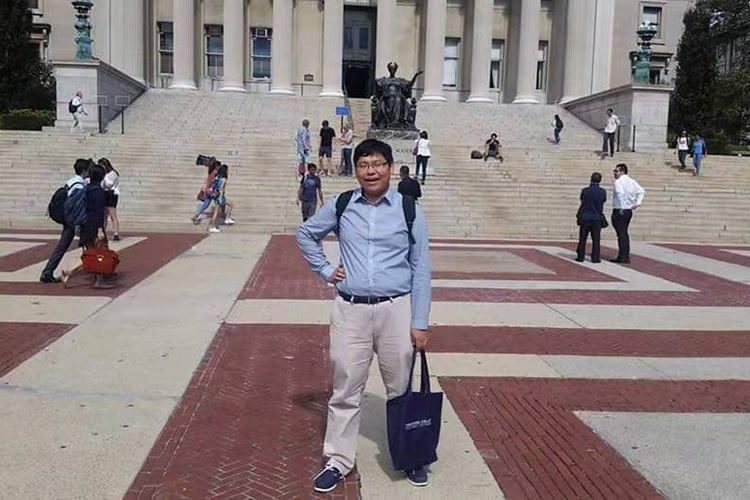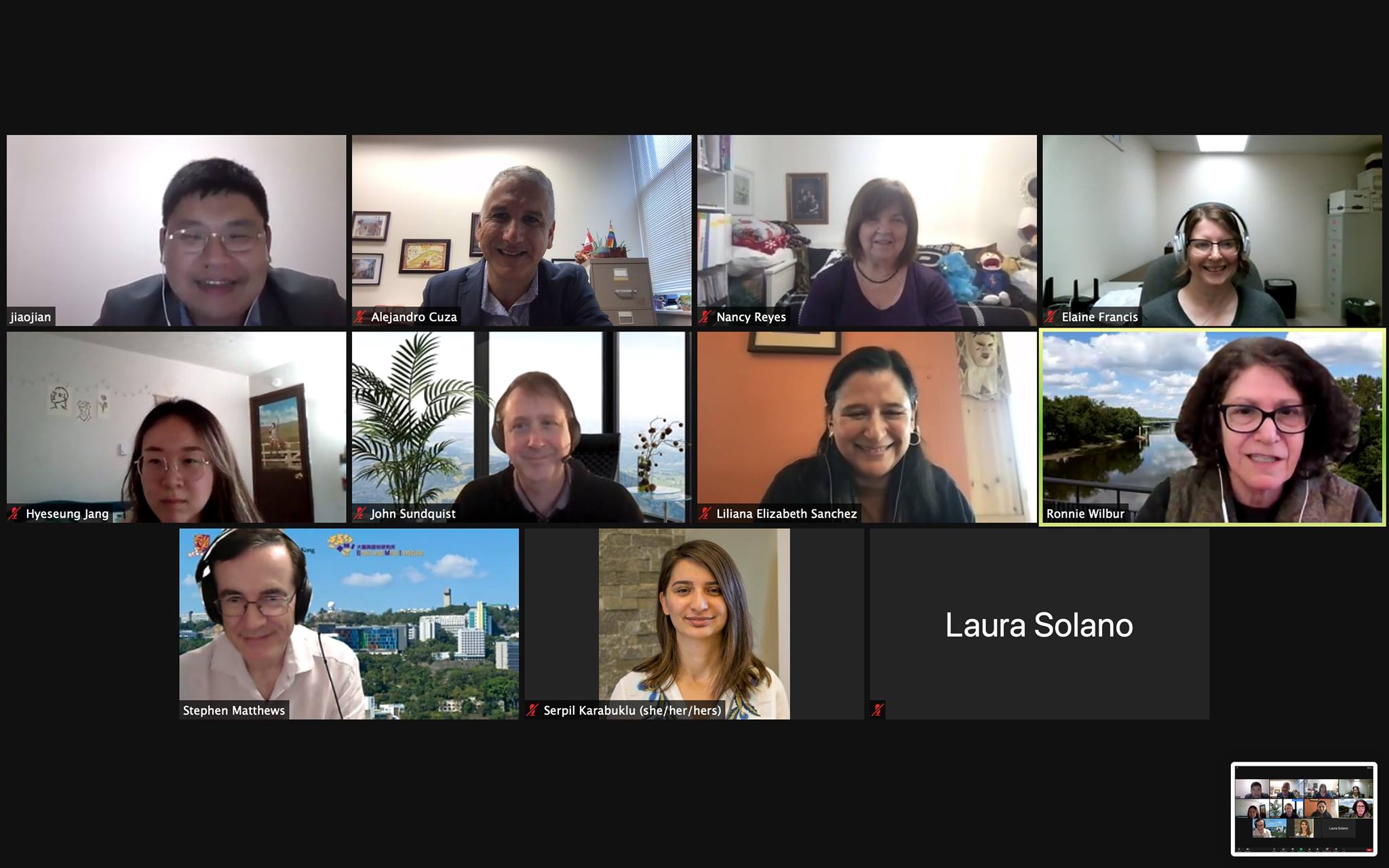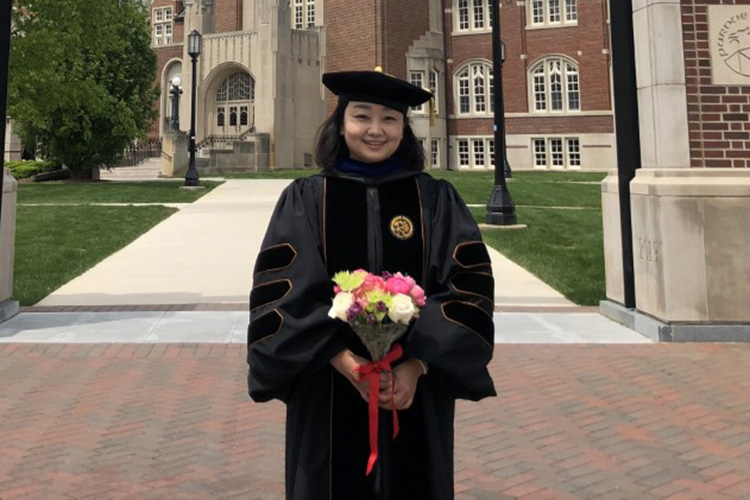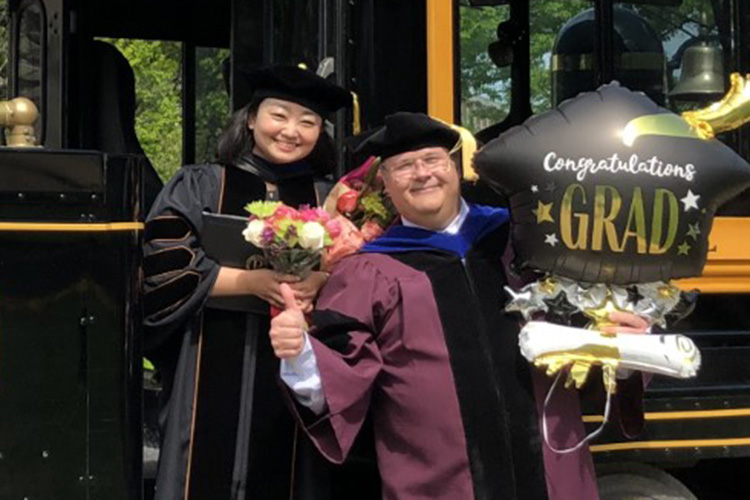Pandemic-weary graduates celebrate hard-won commencement here and abroad
Purdue University graduates enjoyed an in-person commencement ceremony in May unlike any other commencement in the history of Purdue. It was a watershed moment for graduates whose lives were upended by a pandemic that punctuated their time at Purdue.
Purdue University master’s degree candidates celebrated in Ross-Ade Stadium on Saturday, May 15, while the hooding ceremony for doctoral candidates was held in Elliot Hall of Music the following day.
It was one of those stunningly beautiful spring weekends in West Lafayette, a fitting backdrop for Purdue’s first in-person commencement in a year. For the 612 master’s degree candidates, commencement took place on May 15 in an outdoor ceremony at Ross-Ade Stadium along with 4,679 undergraduate candidates and 213 professional candidates. The following day, 198 doctoral candidates enjoyed a traditional hooding ceremony at Elliott Hall of Music while still meeting Protect Purdue health and safety guidelines.
The epic pandemic-related challenges of the preceding year seemed to be fading into the background, even as smiles were hidden behind masks and hugs were traded for elbow bumps. But for many students whose lives were reshaped by a pandemic, the challenges they overcame will not soon be forgotten.
Travel restrictions stranded PhD candidate in China

The pandemic forced Jian Jiao (MA ’17, PhD ’21) to significantly change the research modality for his dissertation, but with determination and the support of his advisor, he was able to graduate on time.
One May graduate who was unable to attend the in-person ceremony was Jian Jiao (MA ’17, PhD ’21). Jiao had every intention of attending commencement, but as a result of the COVID-19 pandemic, he was grounded in China while collecting data for his dissertation. Travel restrictions and the deteriorating global environment meant that he was unable to return to the U.S., forcing him to make significant changes to his research plan.
Jiao specializes in Hispanic linguistics. His research focused on how Chinese-speaking Spanish learners acquire Spanish object pronouns. He needed both Chinese-speaking classroom learners of Spanish in China and Chinese immigrants in Spain as research participants. He went to China in 2019 and had planned to also travel to Spain to recruit participants for his study. But the pandemic hit, and he never made it out of China.
“I went back to China on a fellowship for the academic year 2019-2020, and my plan was to finish the experiment design and collect data in China, and then travel to Spain for the recruitment, and finally go back to the U.S. for data analysis and writing the rest of the dissertation in fall 2020,” he said of his pre-pandemic plans. “I was ‘stuck’ since the spring semester of 2020 and the entire academic year of 2020-2021 because I could not travel to Spain to collect data.”
Ultimately, like so many students who were forced by pandemic restrictions to modify research plans, Jiao had to change the modality of the experiment from face-to-face interviews to an online survey.
Changing his research modality was only one hurdle for Jiao. He was now on the opposite schedule from his advisor, Alejandro Cuza, a professor of Spanish and Linguistics. The time difference between the two was 12 hours.
“It was somewhat difficult to find the right time for my advisor and to have online meetings. I would like to thank my advisor, Dr. Alejandro Cuza for his availability and flexibility because sometimes we had talks in the morning or at night in the U.S.”
Not a change in modality, nor being stranded halfway around the world from Purdue, nor difficulties connecting synchronously with his advisor would keep Jiao from making progress and graduating on time.

For Jiao and many Purdue students and young alumni who were in college during the pandemic, the resilience, perseverance, and grit needed to get through this ordeal will define them as a generation.
“My goal was to graduate this May. In order to reach the goal, I would do everything I could. I had support from my friends with participant recruitment at both sites and with data analysis. Finally, I worked everything out with the help of my advisor and our staff members,” Jiao said.
Jiao never was able to return to West Lafayette to take one last victory lap around campus or to express his gratitude to his supporters in person, though he is able to watch the commencement ceremonies online.
“It is really a pity that I could not attend the commencement and thank everybody in person,” he said. “I am grateful to Purdue not only because of the education, but also because I felt like being home, especially in Stanley Coulter Hall. The campus and the years I spent there will always be a part of me.”
Jiao will be working as an educator and academic in China. He will continue his research in how the Chinese-speaking population acquires Spanish.
Canceled in-person internship pivots to valuable remote experience in non-profit sector

Wan Hee Kim (PhD ’21) missed the opportunity to travel and work in the Washington, DC, area for a coveted internship as a result of the pandemic, but she had a positive virtual internship experience instead.
Unlike Jiao, Wan Hee Kim (PhD ’21) was able to attend commencement in May. She graduated with a PhD in Literacy and Language Education. But like Jiao and so many Purdue graduate students, her last year as a student didn’t go as planned. The pandemic altered a coveted internship as well as her dissertation plans.
Kim was awarded a prestigious competitive National Assessment of Educational Progress (NAEP) doctoral student internship that was to take place the summer of 2020. She was looking forward to the 10-week internship not only for the learning experience but for the opportunity to work and live in the Washington, DC, area.
The pandemic forced a cancelation of the internship, but the organization was able to pivot to a different model and offer her a meaningful remote internship experience. As an intern she worked with researchers and staff from the American Institutes for Research (AIR) in the area of data visualization.
“At first, I felt a little disappointed that I wouldn’t be able to participate in the internship program in the DC area,” Kim said. “However, thankfully, AIR offered us the chance to participate in a virtual internship program. As a data visualization summer intern, I was given the opportunity to work on a project focusing on the new ways to visualize student performance in relation to technology access and availability gaps using publicly available data.”
The project culminated in Kim presenting her project virtually to AIR and National Center for Education Statistics staff. Ultimately, the canceled in-person internship turned out to be a positive virtual experience that enabled Kim to try out working outside of academia.
“What I found most valuable about my summer internship experience was collaborating with like-minded people working on various projects. It was also a unique experience as a doctoral student to be part of a non-profit research institution outside an academic setting,” she said.

Kim also had to make major changes to her dissertation research design due to the challenges associated with collecting data via teacher interviews as schools began to shut down and shift to remote instruction during the pandemic. Her dissertation explored teachers’ awareness of the current federal education policy in relation to English-language learners. She came up with an alternative design that stayed true to her topic and the data she was able to collect.
Kim credits the support she received, including from advisor Wayne Wright, professor and Barbara I. Cook Chair of Literacy and Language, for supporting her.
“Dr. Wright and the committee members were very understating of my situation and allowed me to revise my dissertation research design to exploratory sequential mixed methods design from explanatory sequential. My advisor, many faculty members, and staff were very supportive of providing feedback on my dissertation drafts, my hybrid/hyflex teaching, and all the necessary forms and steps needed to defend and deposit,” Kim said.
She also cited Purdue’s many resources that were available virtually, such as the statistical consulting service, writing lab, and thesis and dissertation office, for providing valuable help when it was needed during the pandemic.
Kim plans to work in the field of language teaching.
Writer: Korina Wilbert